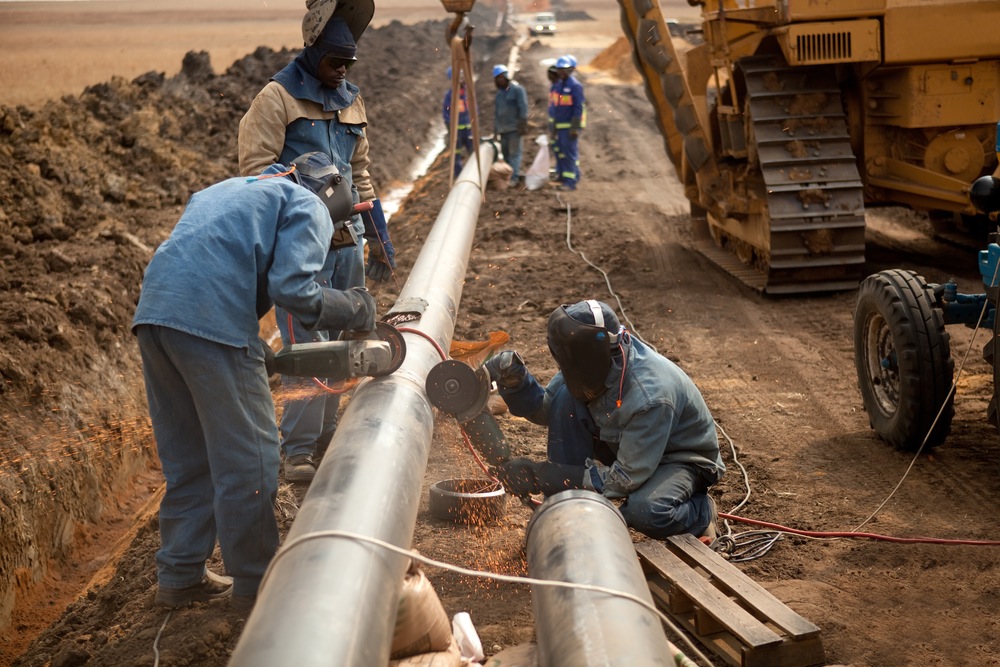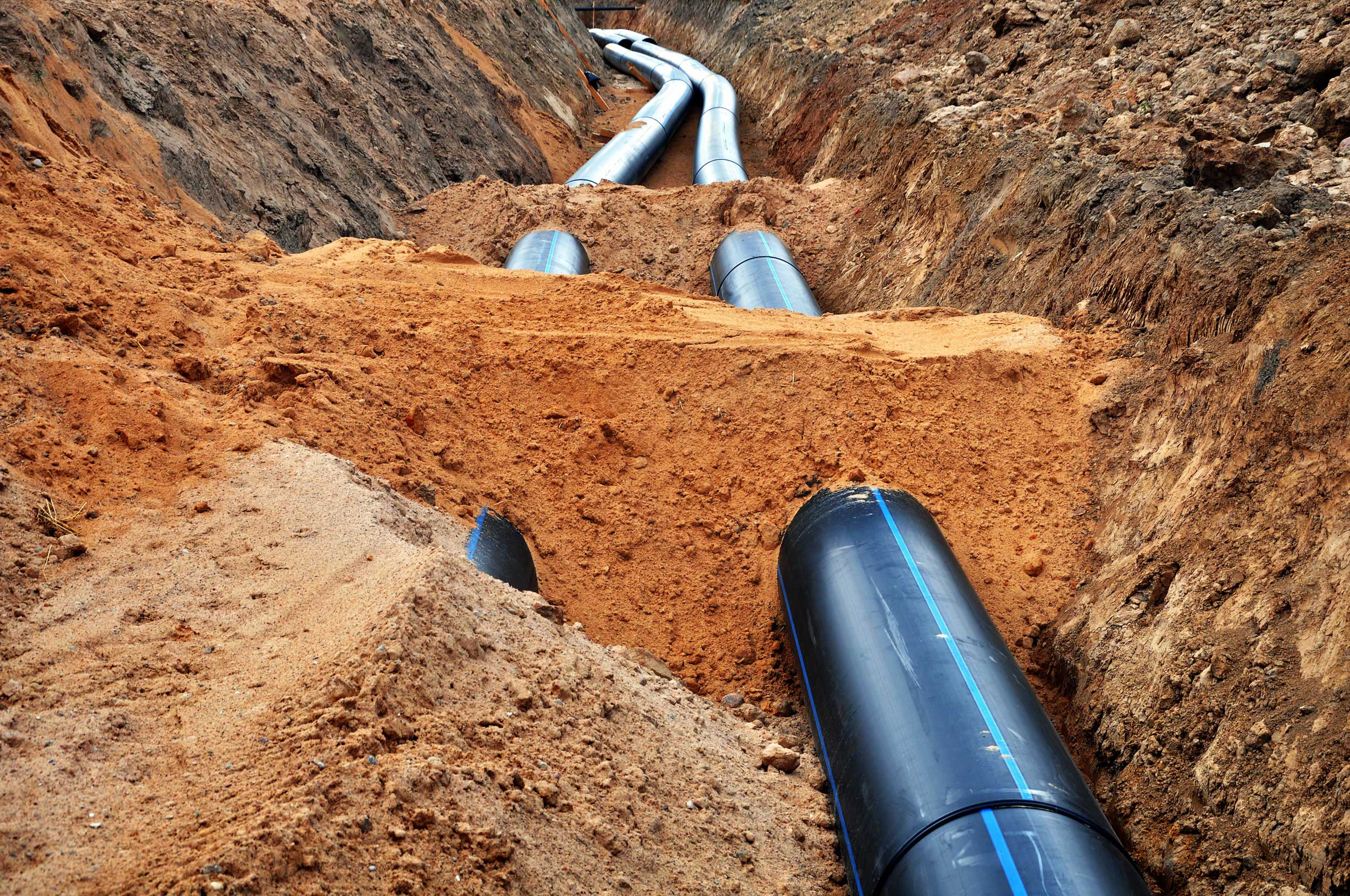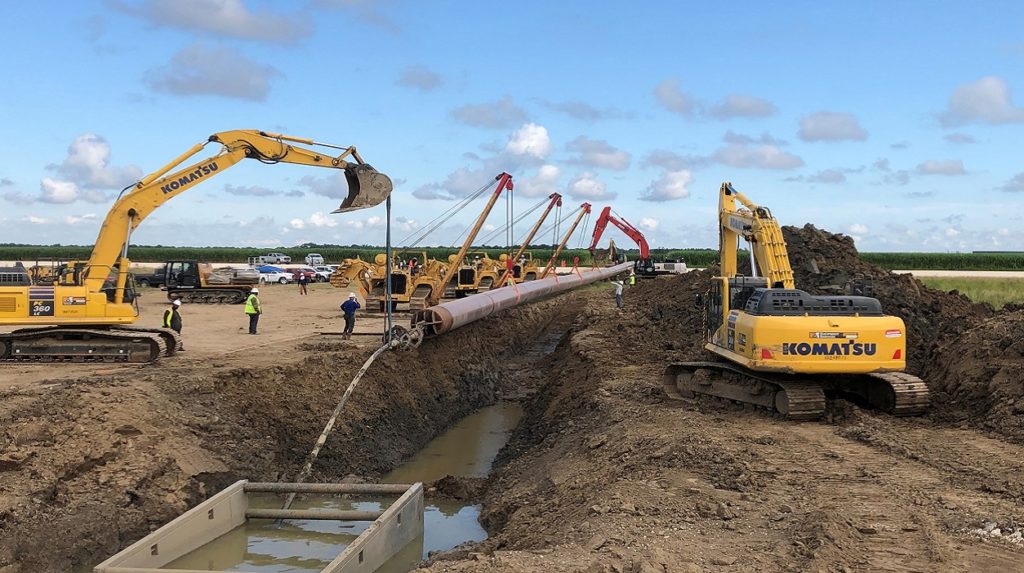How Pipeline Construction Excellence Stand Out in Large-Scale Infrastructure
Why Pipeline Construction Is Essential for Power Facilities Advancement
Pipeline construction plays an important duty in the development of power framework, working as the backbone for the transportation of essential sources like oil and natural gas. This elaborate network not only helps with effective distribution but also reinforces financial growth via work development and regional financial investment. In addition, advancements in safety and security innovations are addressing ecological concerns, positioning pipelines as a foundation of sustainable energy techniques. Nevertheless, the complexities surrounding pipe tasks raise crucial concerns regarding regulatory frameworks and their lasting influence on areas and communities. Exploring these dimensions exposes a multifaceted story that requires cautious factor to consider.
Duty of Pipelines in Power Supply
The critical function of pipelines in energy supply can not be overstated, as they offer as the backbone of contemporary energy framework. Pipelines are necessary for the effective transportation of various forms of energy, including oil, gas, and fine-tuned products. They promote the movement of these sources from removal websites to refineries and distribution centers, making certain that power gets to consumers in a prompt manner.The construction of pipelines entails precise preparation and adherence to regulatory criteria, reflecting the intricacies of the power market and ecological considerations. Reliable pipe networks are created to reduce transit times, lower prices, and enhance safety, while also resolving possible environmental effects. The capacity to carry big quantities of energy over long distances makes pipelines a favored choice for energy business aiming to maximize their supply chains.Moreover, pipelines add to power safety and security by branching out supply paths and sources. As international power needs change, pipelines enable regions to gain access to different energy products, mitigating dangers related to dependence on solitary resources. This diversity promotes competitive prices and stabilizes markets, which is essential in a progressively interconnected worldwide economy.In addition to their logistical advantages, pipelines support regional economic situations by developing work throughout construction and upkeep phases. The presence of a robust pipe infrastructure additionally attracts investments in power jobs, further boosting regional growth. Inevitably, pipelines are vital to the energy sector, providing a reliable and reliable ways of transportation that underpins financial growth and sustainability.

Advantages of Reliable Transportation
Reliable transportation with pipe systems offers substantial advantages, including minimized transportation expenses and boosted delivery rate. These benefits not just enhance the overall business economics of energy circulation however likewise play an important duty in decreasing the environmental effect related to power transport. As power needs continue to rise, the significance of optimizing transport methods becomes progressively evident.

Minimized Transportation Costs
Minimized transportation expenses stand for a noteworthy benefit in the domain of energy facilities growth. The construction of pipelines offers a much more economically feasible means of moving power sources compared to alternate methods such as trucking or rail transport. Pipelines, when established, enable for the continuous circulation of oil, gas, and other items over lengthy distances with minimal operational costs.One of the main reasons for reduced transportation costs is the efficiency of pipeline systems. They can move large quantities of products all at once, thus spreading dealt with prices over a greater amount of item. This mass transportation ability significantly decreases the cost each, making energy resources much more affordable for customers and companies alike.Additionally, pipelines decrease the risks and costs connected with handling and storing volatile products. Unlike rail or road transport, which can incur hold-ups and damage, pipelines supply a safer and more constant technique of power conveyance. This integrity enhances the financial usefulness of power tasks, permitting for much better prices structures in competitive markets. Eventually, minimized transportation costs promote a more lasting power sector, advertising larger access and encouraging investment in more advancement.
Enhanced Distribution Speed
Pipelines substantially improve distribution speed in power transportation, offering a crucial advantage over standard approaches such as trucking or rail systems. The continuous circulation of products through pipelines enables a stable and efficient transport process, lessening delays linked with loading and discharging. This continuous activity is particularly essential for power sources, where demand can vary rapidly.Moreover, pipelines can run around the clock, unaffected by website traffic conditions or weather-related disruptions that can hamper road or rail transportation. This reliability assures that power items reach customers swiftly, supporting operational needs and strengthening economic security. Additionally, the scalability of pipeline systems facilitates the handling of large quantities of power, which is critical for meeting the growing needs of sectors and residential sectors.Furthermore, the integration of innovative tracking and control modern technologies in pipe systems improves the distribution procedure. These innovations permit real-time tracking of flow rates and system pressures, assuring that any prospective issues are addressed immediately. Overall, the enhanced shipment speed given by pipelines is a significant element in enhancing energy facilities and ensuring that supply chains stay durable and receptive to market demands.
Environmental Effect Considerations
The benefits of swift energy transportation extend past logistical benefits; they also encompass substantial ecological factors to consider. Reliable pipeline systems enable for the transportation of power sources with minimal disturbance to environments contrasted to different methods such as vehicle or rail transportation. Pipelines can promote the motion of oil, gas, and various other materials in a highly focused way, which reduces the carbon footprint connected with energy distribution.Moreover, pipelines are created with sophisticated safety and security and tracking modern technologies that greatly lower the risk of spills and leakages. A reliable pipe facilities decreases the need for constant transport activities, which can result in reduced greenhouse gas exhausts gradually (Midland Pipeline Construction Authority). Also, the capability to carry energy sources directly to customers lowers reliance on more contaminating transportation techniques, further benefiting air quality.In addition, calculated pipe positioning can aid protect sensitive environments by adhering to existing hallways, therefore reducing the effect on wild animals and all-natural landscapes. In general, the construction of pipelines not just sustains energy infrastructure development however additionally supplies an eco accountable ways of transferring energy, adding to a more lasting future
Economic Influence of Pipeline Projects
The economic influence of pipeline tasks extends beyond simple transportation effectiveness, considerably affecting regional and regional economies. These initiatives produce task opportunities throughout both construction and recurring operations, promoting neighborhood advancement (Pipeline Construction Authority). Furthermore, the stimulation of economic growth with increased financial investment and infrastructure improvement is a crucial benefit of pipe construction
Job Development Opportunities
While energy facilities tasks usually deal with scrutiny, they present substantial task production chances that can favorably influence local economies. Pipeline construction tasks need a varied variety of experienced labor, consisting of engineers, task supervisors, and specialized specialists, in addition to inexperienced workers for different roles. This diverse need for labor can result in the development of hundreds of jobs throughout the construction stage and usually leads to long-lasting job opportunity once the facilities is operational.In addition to Midland Pipeline Construction Authority route work, pipeline projects boost local economic climates by creating secondary task chances in sectors such as transportation, manufacturing, and friendliness. Local companies gain from increased demand for products and solutions, adding to general financial wellness. Furthermore, the increase of workers can bring about enhanced tax obligation revenues for regional federal governments, which can be reinvested in social work and infrastructure.Moreover, pipe construction jobs typically focus on working with neighborhood employees, promoting a feeling of community financial investment and assistance. By connecting the space in between energy supply and need, these jobs not just improve power safety yet additionally act as catalysts for financial development, enhancing the value of pipeline construction in work development campaigns.
Economic Growth Stimulation
Pipeline jobs serve as an effective economic growth stimulation, driving considerable financial investments into local and local economic situations. The construction and operation of pipelines create a surge effect, creating need for products, devices, and solutions (Midland Pipeline Construction Authority). This influx of funding sustains regional companies, from making to friendliness, promoting a durable financial environment.Moreover, these jobs generate substantial tax obligation incomes for districts and states, which can be reinvested in public services, framework improvements, and area development initiatives. The financial advantages prolong past instant work production, as experienced labor is often required for ongoing upkeep and procedures, making sure lasting employment opportunities.Additionally, the enhanced energy framework facilitates the effective transport of resources, potentially reducing power costs for consumers and services alike. By enhancing energy ease of access, pipelines can attract brand-new sectors and promote growth in existing fields, contributing to total financial diversity
Ecological Considerations and Developments
Balancing energy needs with environmental integrity comes to be increasingly essential as pipe construction expands. The search of efficient energy transportation should represent environmental influences, requiring cutting-edge practices and modern technologies that decrease eco-friendly disturbance. Modern pipe tasks are significantly incorporating advanced environmental evaluations at every phase, making sure that prospective dangers are identified and minimized early in the preparation process.One remarkable innovation in this field is the fostering of trenchless modern technology, which enables the installation of pipelines without extensive surface disruption. This approach minimizes environment fragmentation, maintains existing communities, and reduces the carbon footprint connected with conventional excavation techniques. Additionally, real-time surveillance systems geared up with sensing units make it possible for drivers to find leaks or ecological adjustments swiftly, thereby helping with prompt actions to potential hazards.Moreover, the incorporation of eco-friendly products and construction strategies is gaining grip. Biodegradable exploration liquids and corrosion-resistant finishes can significantly reduce the environmental impact of pipeline tasks. Business are additionally the original source committing to bring back habitats post-construction, utilizing native plant varieties to aid in community recovery.Collaboration with ecological firms and regional communities is necessary - Pipeline Construction Authority. Involving stakeholders in the decision-making process promotes transparency and promotes lasting techniques, making sure that energy facilities development aligns with environmental stewardship
Difficulties in Pipeline Construction
Amidst the expanding need for energy framework, different difficulties make complex the construction of pipelines. Among the key issues is the geographical variability of pipeline paths, which can go across varied landscapes, consisting of hills, rivers, and metropolitan areas. Each setup requires customized engineering options to resolve ecological protection, geological security, and logistical constraints.Additionally, the public assumption of pipe tasks frequently presents a considerable obstacle. Regional neighborhoods may reveal issues concerning potential environmental effects, security risks, and disruption during construction. This resistance can bring about hold-ups, raised prices, and the requirement for comprehensive community engagement techniques to promote acceptance.Moreover, labor scarcities in skilled professions additionally make complex pipe construction initiatives. As the need for energy infrastructure expands, the schedule of skilled personnel lessens, which can bring about job hold-ups and raised labor prices. The pipeline market should purchase labor force advancement efforts to grow a competent labor pool qualified of satisfying the progressing demands.Safety remains a critical worry throughout the construction process. The sector encounters the obstacle of guaranteeing that all security methods are followed, as even small lapses can lead to significant accidents. This necessitates extensive training and oversight to maintain functional integrity.Lastly, rising and fall material costs can affect project budget plans and timelines. The requirement for premium materials, paired with market volatility, calls for careful monetary preparation and risk reduction strategies to maintain projects on course. Dealing with these obstacles is important for the effective and effective construction of pipelines as component of a robust power framework.
Regulatory Framework and Conformity
The governing framework governing pipeline construction is complex and diverse, requiring conformity with a range of government, state, and regional policies. At the government level, companies such as the Federal Power Regulatory Payment (FERC) and the Pipeline and Hazardous Products Safety Management (PHMSA) play vital duties in managing pipeline jobs. FERC manages the transportation of natural gas and oil, accepting jobs based upon financial requirement and public rate of interest, while PHMSA focuses on security standards and the honesty of pipe operations.State laws can differ substantially, with specific states enforcing their own allowing processes, safety regulations, and ecological analyses. State public utility payments might require added examination of recommended paths to assure very little disruption to areas and environments. Compliance with the National Environmental Plan Act (NEPA) is likewise needed, mandating comprehensive environmental influence evaluations prior to project approval.Local laws may even more complicate the conformity landscape, as communities frequently have details zoning legislations, land usage policies, and neighborhood involvement demands. Engaging with neighborhood stakeholders is not only a governing necessity yet likewise an ideal practice to facilitate smoother project execution.Moreover, the governing landscape is constantly evolving, influenced by public belief, technological innovations, and environmental plans, demanding consistent watchfulness from pipeline drivers. Steering with this complex governing structure is crucial for validating that pipe construction projects are not only legally certified yet also socially accountable and environmentally sustainable, thereby contributing to the general effectiveness of energy facilities growth.
Future Fads in Pipeline Infrastructure
A considerable transformation is underway in pipe framework, driven by improvements in innovation, progressing energy needs, and increasing environmental consciousness. As the worldwide energy landscape changes in the direction of renewable sources, pipeline systems are adapting to suit diverse power kinds, consisting of gas and biofuels, while additionally incorporating a lot more sophisticated tracking and security technologies.One noteworthy fad is the unification of electronic remedies, such as Internet of Things (IoT) devices and synthetic knowledge (AI), which enhance real-time monitoring and anticipating maintenance capabilities. These developments not only enhance functional effectiveness but additionally noticeably lower the danger of leaks and crashes, making sure better ecological security. Additionally, using advanced materials, such as composite pipelines, is getting grip as a result of their longevity and resistance to deterioration, additional prolonging the lifespan of pipe systems.Moreover, the emphasis on sustainability is prompting the advancement of greener construction techniques. Methods such as trenchless modern technology minimize land disturbance and environmental influence, lining up pipe jobs with modern environmental requirements. Additionally, regulatory frameworks are progressing to advertise transparency and accountability in pipeline procedures, making sure stakeholders are a lot more informed regarding potential threats and weblink advantages.
Often Asked Questions
Just How Do Pipelines Contrast to Various Other Transportation Methods for Power Resources?
Pipelines offer an affordable, reliable, and eco-friendly method for delivering power resources compared to choices like trucks and trains, which commonly sustain greater operational costs, higher land use, and increased greenhouse gas discharges. - Pipeline Construction Excellence

What Products Are Commonly Used in Pipeline Construction?
Common materials used in pipe construction include carbon steel, stainless-steel, and plastic compounds. These materials are selected for their strength, longevity, rust resistance, and viability for different ecological conditions and kinds of delivered power sources.

For how long Does It Generally Require To Develop a Pipeline?
The period for pipeline construction differs considerably based upon variables such as size, surface, and governing requirements. Generally, it can vary from numerous months to a few years, depending on job intricacy and ecological factors to consider.
Who Are the Secret Stakeholders in Pipeline Projects?
Key stakeholders in pipe jobs consist of federal government agencies, governing bodies, power business, ecological companies, regional communities, and landowners - Midland Pipeline Construction Authority. Each group plays an important function in planning, permitting, construction, and continuous procedures of pipeline framework
What Are the Key Safety Measures During Pipeline Construction?
During pipeline construction, primary safety and security procedures include rigorous site evaluations, adherence to governing standards, comprehensive training for employees, making use of individual protective devices, and constant surveillance of environmental problems to reduce dangers and ensure functional safety and security.